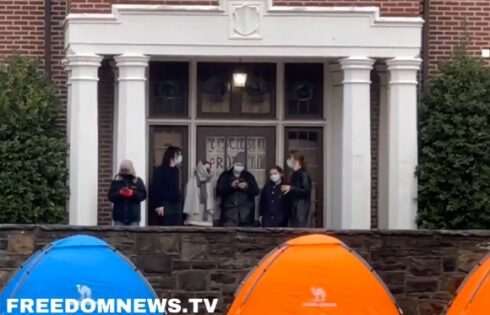
A popular activity of college progressive activists is seeking new names for campus buildings, especially those named after proponents of racial segregation.
Yale is one of the more notable examples of such; last year after much controversy and debate it changed the name of its Calhoun College to one honoring Grace Murray Hopper, a noted female US Navy Rear Admiral. John C. Calhoun was a white supremacist and proponent of slavery.
Other schools are in the process of debating name changes.
Buildings aren’t the only targets of renamers; mascots such as “crusaders,” the title of house “masters,” and even the name of Cornell University’s Plantations — a massive garden and arboretum — have been changed due to “non-inclusive” and racial overtones.
The debate is this:
Buildings and other campus areas are history, and the figures for whom they’re named should be viewed via the time in which they lived.
On the other hand, the US is a very diverse nation and it’s insulting for racial minorities to sit in buildings named after people who viewed them as inferior. Or worse.
At George Washington University, the Student Association is “relaunching” a task force which is, well, tasked with the job of looking into the “controversial history” behind some of its campus edifices.
According to a report in The Hatchet, SA vice president for diversity and inclusion Shelby Singleton proposed that a group comprised of students, faculty, and other officials look into the university’s Marvin Center and Lisner Auditorium, both named after former GW figures “who students say were discriminatory toward students of color.”
Previously, two GW buildings named after university presidents who had sold slaves to pay off the school’s debt were renamed in 2015.
The current situation isn’t as cut and dry, so to speak.
The Marvin Center is named after Cloyd Heck Marvin, a former GW president who supported racial segregation.
However, note how the Hatchet explains the Lisner Auditorium background:
Singleton said that in addition to examining the Marvin Center, students will also look into changing building names like Lisner Auditorium, which was built in 1943 using a donation from former trustee Abram Lisner. The theater was previously segregated and denied entry to black attendees, including the dean of Howard University’s medical school three years after its debut – leading to a leaflet and boycotting campaign and canceled performances.
The Hatchet doesn’t state that Lisner was a racist or segregationist — it says the theater named after him was segregated, a significant difference.
An article about desegregation at George Washington University notes that the university president at the time of the Lisner Theater protests — ironically Cloyd Heck Marvin — suspended then-Hatchet editors for a pro-desegregation editorial. Marvin told the editors that their piece jeopardized financial gifts made to the school, including that from the Abram Lisner estate.
Under a photograph of Lisner, a caption states “anecdotal evidence” suggests “restrictions on his bequest was one reason for the [theater’s] whites-only policy.”
Another resource has a somewhat different take. Lisner, a German who came to the US at age 12, “was a champion of getting women opportunities in the business community and the professions,” it says, and goes on to note the philanthropist “made the law dept. at George Washington University coed despite fierce opposition.”
But later on, we read this:
Mr. Lisner’s will also left $1.5 million to be used to start a home for indigent ‘white’ women who were natives of D.C. but it’s unclear if that was ever built. What was built: The words “charitable”, “needy”, “reduced by misfortune”, “indigent”, and “destitute” are embedded in the histories of four vanguards of service to the Washington senior community.
So it seems Mr. Lisner was rather forward-thinking at least in terms of gender parity, but “anecdotal evidence” exists which indicate his racial views weren’t quite up to snuff.
The College Fix reached out to Ms. Singleton to inquire if she had further information about Lisner’s views and background, but received no response.
MORE: Clemson students revive controversy over its Tillman Hall
MORE: Name change craze continues: Add Woodrow Wilson to the list
IMAGE: Urustar/Flickr.com






Please join the conversation about our stories on Facebook, Twitter, Instagram, Reddit, MeWe, Rumble, Gab, Minds and Gettr.